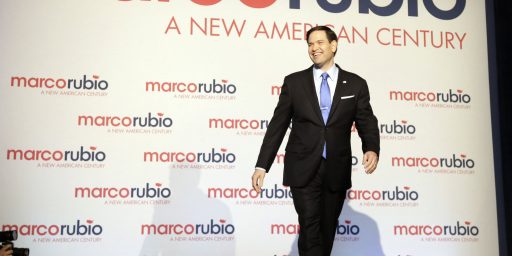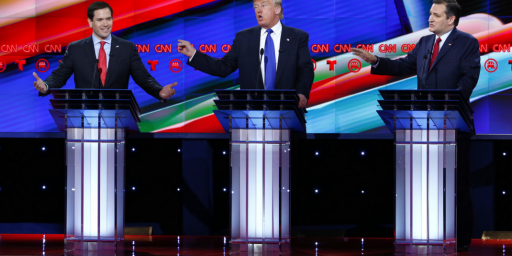Two-Thirds of Tea Party Candidates Lost?
An NBC analysis shows Tea Party candidates winning only 5 of 10 Senate races and 40 of 130 House races, a success rate of only 32 percent.
For all the triumphalism of the Tea Party in taking credit for the Republican wave Tuesday, the fact of the matter is that only a third of their candidates won — which means two-thirds lost. So says NBC’s Alexandra Moe:
In the Senate, 10 candidates backed by the Tea Party ran and at least five were successful. (Race in Alaska has not yet been called.)
In the House, 130 Tea Party-backed candidates ran, and just 40 so far have won.
Identifying Tea Party candidates is undoubtedly inexact. Our criteria, generally, was to include anyone who has either been backed by a Tea Party group or has identified themselves as a member of the Tea Party movement. Toward the end of this cycle, however, seemingly every Republican was trying to associate themselves this way. One left off the list was Dino Rossi, despite Jim DeMint endorsing him, since Tea Party groups backed Clint Didier in the primary.
As Steven Taylor noted Tuesday, it’s hard to know which candidates are Tea Partiers. But Moe’s method, described above, seems reasonable enough.
In the Senate, it was 50-50:
5 WON – 50% of Tea Party candidates won
PA- Pat Toomey
KY- Rand Paul
FL- Marco Rubio
WI- Ron Johnson
UT- Mike Lee4 LOST – 40% of Tea Party candidates lost
DE- Christine O’Donnell
NV- Sharron Angle
WV- John Raese
CO- Ken Buck
1 UNDECIDED
AK- Joe Miller
It’s safe at this point to put Miller in the Lost column.
The winners are pretty impressive. Toomey and Johnson fought hard races well, taking the Arlen Specter and Russ Feingold seats.* The three others were surely going Republican with or without the Tea Party: The only Democrats in Utah are passing through and Charlie Crist would have cruised to victory in the Republican primary and the general absent Rubio. But Rubio, in particular, was actually a quite superb candidate who’s likely a rising star in Republican politics.
The losers, by contrast, all lost races that would have been easy for a more experienced Republican politician. Mike Castle would have won Delaware without a fight and a random person from Nevada’s voter registry would have beaten Harry Reid. But crazy is a hard sell. Thankfully, Alaska is so Republican that the winner was also a Republican.
But here’s where it gets tricky: Of the 130 Tea Party candidates for the House, 40 won, 82 lost, and 8 were undecided as of last evening.
The problem is that there’s no analysis given of the seats — just a listing of districts and candidates. 15 of the losses were in California alone and another 7 in New York. Granted, there were also losses in Florida, Georgia, Kentucky, North Carolina, Texas, and Utah. But, offhand, I don’t know how competitive these races would have been. It’s quite possible, though, given the vagaries of gerrymandered districts, that the reason the Tea Party was able to run candidates is that the Republican primary doesn’t attract much interest. Losses in seats that were never in serious play shouldn’t count against the Tea Party.
Now, it seems clear that the Tea Party’s selection of truly awful candidates in some Senate races cost the Republicans some seats they could have won — and quite possibly a majority in that body. But the movement also generated some significant chunk of the vaunted “enthusiasm gap” that helped Republicans take back the House. It’s a very mixed bag.
_________________
*I know some object to naming seats after the office holders, on the grounds that “They’re the PEOPLE’s seats!” But it’s a useful shorthand.






“For all the triumphalism of the Tea Party in taking credit for the Republican wave Tuesday, the fact of the matter is that only a third of their candidates won”
And throughout the Republican leadership quiet, but deeply, deeply heartfelt, thanks were offered up.
OTB is so beyond the pale. You just don’t get it. This is just the begining. Pull your head out of the ground.
To be fair, it’s not a bad result for movement (or whatever we’re supposed to call it) that didn’t exist at the time of the last election.
In addition to no analysis of the districts, there’s also no information on whether there actually was an experienced Republican available to run (other than the obvious).
Let’s see… as noted, the Tea Party movement is less than two years old. In that time, they managed to win a full third of the federal elections they ran for? They fought one whole party and the establishment of the other, and won one out of three races they fought for?
That’s nothing less than astonishing.
J.
@Michael,
Out of curiosity, and I sincerely ask: what is it that you think is going to happen?
***OTB is so beyond the pale. You just don’t get it. This is just the begining. Pull your head out of the ground.*** HEAR HEAR!!!!
Also, CBS is reporting that of the candidates endorsed by Palin, theoretically the Good Housekeeping seal for the TP, 30 of 43 were elected to the House (with some still undecided), and 7 of 12 to the Senate. I guess it just depends on how the reporter wants to frame the story.
Oh, and a special shout-out to Doug “Charles Johnson Lite” Mataconis: Sarah Palin backed a total of 43 House candidates; 30 won, 9 are still undecided.. She backed 12 Senate candidates, and seven won. That puts her percentage of backing winnners at a minimum of 66% and a maximum of 84%.
J.
Except that they didn’t. Republicans won those seats, not people from something called the “Tea Party” on the ballot. Had that happened, I would agree with your assessment.
Just to pick the first name from the list: Pat Toomey. Are you telling me that he represents some new kind of politician? He’s been in the House since 1998.
Semantics. The Tea Party movement is, essentially, an “insurgent” group within the GOP. They have allies within the established GOP, but they are NOT of the GOP.
Note that the Toomey race put him in the seat held by Arlen Specter, who was a Republican before switching in hopes of keeping his seat against the rising movement. So I’d view that as a victory over the establishment GOP.
J.
“Tuesday, the fact of the matter is that only a third of their candidates won — which means two-thirds lost. ”
Gee, they did almost as good as the Democrats.
@Jay Tea:
Words (i.e., semantics) matter when trying to define things like party label and how it impacts elections and the way legislatures work.
Further, I find it amusing (and logically problematic) that you accuse me of arguing from semantics and then have to do acrobatics to turn a Republicans beating a Democrat into the Tea Party beating the establishment Republicans.
Toomey, an establishment Republican by definition (again: a US Representative since 1998), beat Sestak (a Democrat) and you are going to turn that into the Tea Party beating the Republican establishment? That’s not just semantics, that’s political alchemy.
Specter, btw, lost his reelection bid by being beaten in the Democratic primary. Was that a Tea Party victory as well?
Steven, Specter was a Republican for DECADES. He switched when he saw that he was going to get kicked to the curb by the GOP mainstream, hoping to curry favor with the Democrats. And it almost worked — Sestak admitted that he was offered a job to give up his challenge and let Specter get the nomination by default. Specter was last elected as a Republican.
Toomey chose to affiliate himself with the Tea Party movement, and won a Senate seat that had elected Republicans for decades. He won the primary, then beat the Democrat. You wanna say that he isn’t part of the Tea Party movement? There are no membership rules or roles; he says he is, he is. And he’s a new Senator.
J.
@Jay:
No, I am not disputing Toomey’s Tea Party endorsement/affiliation. I am disputing the notion that Toomey represents anything other than part of the GOP establishment.
Indeed, the lack of membership rules/roles means that Tea Party affiliation is far less dramatic and significant than you were suggesting in your first comment. That’s the basic point.
I am further disputing that Specter has much of anything to do with the Toomey-Sestak contest at this point. He certainly isn’t relevant in terms of the Tea Party aspect of the discussion. He is now a historical footnote in the contest.
I don’t think that 32% is a small proportion but rather an astonishingly large one. Remember that the Tea Party faction has been in operation for less than two years.
There’s common ground for us — Specter as a footnote. I am happy with that.
I think the conflict here is that Toomey is a victory for the Tea Party movement, but NOT a victory over the establishment GOP like Marco Rubio was. Toomey’s race helped take down a long-standing establishment GOP Senator — it was his challenge that helped push Specter into jumping ship.
A Tea Party candidate winning is necessarily a victory over Democrats (until some Democrats decide to jump on the bandwagon), but not necessarily a win over the establishment GOP. But damn, it’s gotta be scary to be them right now. The Tea Party is where the enthusiasm and energy is these days.
J.
I still have a hard time thinking of Rubio as a Tea Party candidate. His campaign wasn’t overly populist or anti-government. His anti-tax stance was what you’d expect from any candidate with an (R) after their name. He’s more of a straight-up Republican who (rightly, as it turned out) saw Crist’s moderate stances as a point of vulnerability in a party primary.
Now Rick Scott, there’s a candidate who fits the Tea Party definition to a “T”. Extremely populist, vocally anti-government, anti-immigration, and irrationally anti-tax.
“Mike Castle would have won Delaware without a fight”
What evidence is there to support this?
Have you seen the exit polls? It’s not as though independents flocked to Coons. The vote amongst independents was 48% to 45% in favor of Coons. The Dem/Rep split was about even and the exit polls also showed 57% job approval for Barack Obama which gives an indication of how people would vote.
The real problem for O’Donnell was the fact there were just not enough Republicans in the state of Delaware for her to win. 44% – Dem, 30% – Rep, and 17% Ind isn’t going to cut it.
The fact that he had won numerous statewide races as a Republican, as well as polling prior to the GOP primary showing Castle comfortably ahead in the polls. Indeed, does it get any more definitive than this?
Note: the Rasmussen poll that gave Castle +11 was taken last month.
The same poll showed Coons with a +11 over O’Donnell.
Coons won by 16 points.
Well, Delaware is a great test case for whether it is better to lose the good fight rather than surrender for a sub-optimal candidate. Thus far, I think the former is going to pay long term dividends.
Republicans are better off not getting 51 votes in the Senate this year and keeping Harry Reid as the face of the Democrats in Congress. Next election when more Democrats are up than Republicans for the first time in a few cycles this will pay off.
“Remember that the Tea Party faction has been in operation for less than two years.”
Kudos to Dave for using the word “faction.” That strikes me as eminently more reasonable than Jay Tea’s assertion that the Tea Party is “NOT of the GOP.”
“Faction” is decidedly the appropriate terminology.
Michael — Yes, Scott is the perfect Tea Party candidate, a loathesome criminal who made millions stealing from Medicare, and then won by terrifying old people that the Democrats were going to steal their Medicare. If this is what the Tea Party has to offer, then either they are doomed or we all are.
Yeah, yeah, the Tea Party is nothing. No need to pay attention to it. We’ve heard it before. We’ll hear it again. Guess what, we don’t have a parliamentarian government so as much as the chattering class likes to ramble on, having a separate identifiable registered party isn’t that important. What is important is beliefs. Many Republicans “adopted” Tea-Party-speak. They may betray those beliefs, in which case, they will be dealt with. Some Democrats may get the religion. In which case, they’ll be accepted. Joe Manchin pressed his nose up hard against the glass to try to appear part of the party or at least to not be at the one he was part of. And yes, I know a lot of Blue Dogs went down in this cycle, they voted poorly and paid the price.
And really quite whining about Castle. If he’d actually campaigned during the primary and the Delaware establishment Republicans had voted for him, he might have won the nomination but he didn’t and they didn’t. Then the Delaware establishment Republicans chose not to vote for the Republican candidate in the general. So is someone is to blame it is the Delaware establishment Republicans who abandoned their candidate and the national Republicans who publicly sought to sabotage the Republican candidate. So failure to gain control of the Senate belongs to the spoiled tantrum-throwing Republicans in Delaware and DC.
Yes, we have heard the rhetoric of limited government and fiscal responsibility before and we will hear it again, but where’s the legislation? Where’s the actual governing?
That’s the point
And, btw, I (for one) am not saying the TP is “nothing”–I am saying that it is just a specific faction of the GOP and it is not new.
.
Are you saying the Democrats should only have 104 House representatives right now?
I don’t think any reasonable person would expect that. Most of those races the Republican had little to no chance.
A better question is what seats the Republicans hold now and don’t hold that would have flip without the Tea Party. Most analysts I seen on TV liberal and conservative said the Tea Party movement help the Republican Party. You may disagree with them but I don’t.
Some of the winning “tea party” candidates aren’t even really tea party candidates, so much as people the tea party glommed onto after they were already winning.
Toomey and Rubio were both established candidates long before the Tea Party existed. The certainly made use of the Tea Party’s enthusiasm, but they weren’t people who came out of nowhere purely based on Tea Party support (ala O’Donnell).
And Rand Paul was more of a Ron Paul r{EVOL}ution candidate than a Tea Party candidate.
Regarding Toomey:
Don’t forget he nearly won the GOP Sentate Primary six years ago too. Now is the difference between now and then the Tea Party? Or is it that the Republican establishment types finally gave him their support after backing Specter the previou cycle?
And does the credit belong with Tea Party types who only got involved backing Toomey withing the last two years or the Club For Growth types who has been backing him for the last eight?
“To be fair, it’s not a bad result for movement (or whatever we’re supposed to call it) that didn’t exist at the time of the last election. ”
These claims ignore the fact that the tea party is 100% a product of the GOP. The people in it are disaffected republicans and libertarians 9who are ALSO disaffected republicans really). The backers and organizers are, you guessed it, republican party backers and organizers. They used existing republican infrastructure. Their platform is identical to every GOP platform in the last 30 years.
So, no, the tea party is not just 2 years old. It’s just a re-branding of a party that is well over a century old.
@Tlaloc:
Like, for example, Dick Armey. Quite the outsider, he.
(For those scoring at home, he was once the House Majority Leader as a Republican).
This. .320 would be Hall of Fame for a baseball player. For a brand spanking new movement that doesn’t even have any real organization, it’s astonishing. Especially when you also account for the fact that the Times only seems to be looking at national races. Down-ballot, the TP did pretty well, too.
I know I am being redundant here, but: they ran and won as Republicans. They used the basic fundraising mechanisms and sources of the Republican Party. They used the basic Republican organizational structure. They got on the ballot as Republicans. They will caucus as Republicans. This insistence that they are something utterly new is maddening only because it is demonstrably untrue.
This is, again, not to say that TP was/is unimportant. But we have to be accurate in our descriptions and assessments.
I am at a loss to understand Steven L. Taylor’s idea of the GOP “establishment”. For one to be outside the establishment, is it necessary that one be a complete newcomer to politics? Isn’t it possible for one to have espoused the conservative/libertarian Tea Party principles for years, yet be a long-time serving GOP legislator? Michele Bachmann and Jim DeMint can hardly be called political newcomers, yet both are clearly among the leadership of the Tea Party-oriented caucus of the GOP. Toomey, with a lifetime ACU rating of 97% for his congressional service, clearly is a strong conservative. Thus, he seems well-aligned with Tea Party thinking despite the fact that he has political experience.
In my view, the idea that one would be a member of the GOP establishment would be a long-term GOP member of Congress who fails to support the primary conservative values of fiscal restraint and limited government. It has little to do with their degree of political experience if their values tend toward the Tea Party principles. Indeed, the ability of such long-time conservatives to operate within the Washington system is valuable for the newcomers to enact the reforms their constituents desire. Reliably conservative, experienced legislators like Jon Kyl, James Inhofe, and their ilk will be indispensible as the “young Turks” shake things up at the Capitol.
***Especially when you also account for the fact that the Times only seems to be looking at national races.*** My whole state went to Republican control, haha Hello Wisconsin!!!!:):):)
The Tea Party was berry, berry good to me:)
Oddly, GA makes my point:
He states ” My whole state went to Republican control” and “The Tea Party was berry, berry good to me:)”
Emphasis mine.
Steven, there is no denying that the TP candidates ran and won as Republicans. That’s not the point, however. The point is that the TP has been transformative of the GOP in a way no other movement has done to a major party in American politics for a very long time (especially with this degree of suddenness). That makes them indeed something utterly new, at least in modern times. Of course they will caucus as Republicans. That is because they are part of a movement trying to return the GOP to its base conservative principles. Furthermore, Tlaloc, the TP represents a lot more than a simple rebranding of the GOP. That is cynicism or poor semantics at its worst. This movement is having and will continue to have a real impact on the platform and agenda of the GOP. That goes far beyond mere “rebranding”. The revised platform that emerges as the TP gains greater influence over the GOP will vary a great deal from the one advanced by GWB only ten years ago.
An honest and sincere question: by what criteria has the TP been “transformative of the GOP”?
@Tim
“The point is that the TP has been transformative of the GOP”
I submit that this remains to be seen.
I don’t know what things are like where you live but here in Chicago we have regular Democrats and independent Democrats. The independent Democrats may nominally use “the basic fundraising mechanisms and sources” of the Democratic Party but they certainly don’t receive the same reaction from the party institutions that regular Democrats do.
@Dave:
While I understand the basic idea you are putting forth, I am unclear on your exact point. Beyond that, what is the definitional/operational distinction between said Ds and iDs?
Are you saying that there are different factions within the Illinois Democratic Party? If so, you are saying what I am saying about the relationship between the GOP and the TP.
Shorter Jay Tea and G.A.: The people that will caucus with the GOP, were funded by the traditional GOP system, who have been part and parcel of the GOP apparatus for years, and will vote along the GOP party line are magically different than the GOP.
How many states have primary elections that are for a T party? None.
How many states had a T party label on the ballot next to a candidate in the general election? None.
If the T party poopers want to do something they can follow state election laws and get their candidates names on primary and general election ballots with a big T next to the candidates names.
How many T faction US house members will be co-opted by their “grateful” Republican masters in the very near future?
a. 1 b. 10 c. all of them
Bernieyeball
Sees All!
Knows All!
Doesn’t Think Much of Any of It!
Who picks the free Gravatar image?
Ever notice how every time Jay Tea disagrees with someone these days, he calls them out as somehow being affiliated with or similar to Charles Johnson? You sure do have a bug up your ass about that guy, Jay. Seems pathological.
Btw folks, there is no political party called the Tea Party. It’s just a new name for the extreme right of the Republican Party. In a few years, that’s all the party will have left.
Mr. Joyner:
I responded to the comment you posted over on Tom Maguire’s “‘Just’? Where Is The Justice?” thread at JustOneMinute. You’ll find it at 1:00pm. My own comment seemed a little long to for pasting, but I can do so, if length isn’t frowned on here.
Color me cynical, but the TP has yet to have any effect other than rhetorical at this point. Now it maybe that the Tea Party is right when it claims its Republicans really mean it this time, but we won’t know that until January.
However, given their tendacy to talk in generalities while refusing to give any specific details about their proposals, I’m not holding my breath. It’s very easy to say you’re in favor of cutting spending, it’s much harder to do it, particularly when you’ve already declared 80% of the budget off limits (Medicare, Defense, Social Security).
“The independent Democrats may nominally use “the basic fundraising mechanisms and sources” of the Democratic Party but they certainly don’t receive the same reaction from the party institutions that regular Democrats do.”
If the independent Democrats tried to say they were some new, growing force in politics not part of the Democratic Party, I hope we’d be a little skeptical of that claim. Actually, I hope we’d tilt our heads, squint our eyes, and say, “What kind of snake oil are you trying to sell me?”
Dr. Taylor, are you saying the Tea Party shouldn’t be elected becuase they have no governing experience? And how do you propose they obtain this governing experience? Given the performance of hose with governing experience, I have to wonder if governing experience isn’t a tad overrated.
Dr. Taylor, on the other hand, maybe you’re right. Too bad more of the country didn’t demand a little more governing experience from someone who wanted to be president.
@Charles
I never said that they should not have been elected. I am arguing that treating them like something new and unique is a mistake. First, they are clearly a faction of the Republican Party, and must be analyzed as such. Second, contra the notion that they have no governing experience, part of broader point is that many of the Tea Party candidates, like Toomey, are long-time Republican office-holders.